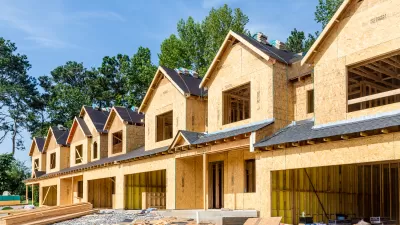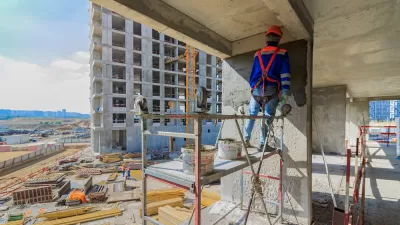The financialization of the housing sector is driving up costs for ordinary families and keeping available units off the market.

The growing impact of institutional investors on the housing market is driving up housing costs for most Americans, asserts a new report from the Institute for Policy Studies (IPS) and Popular Democracy, reinforcing a common belief that the financialization of housing is making it a commodity out of reach for many ordinary households.
According to a Common Dreams article by Julia Conley, “The two groups found that a small number of wealthy individuals and their investment arms, who control "huge pools of wealth," have spent some of their vast resources on "predatory investment and wealth-parking in luxury housing"—contributing significantly to the crises of unaffordable rents, out-of-reach homeownership, and homelessness.”
While the housing crisis is usually blamed on a supply and demand mismatch, “the reality is that the owners of concentrated wealth... are playing a more pronounced role in residential housing, thereby creating price inflation, distortions, and inefficiencies in the market.”
The report includes an example from Los Angeles, where in 2017 there were 93,500 vacant units and roughly 36,000 unhoused residents. Meanwhile, investors are encroaching on the affordable housing market, buying up multifamily properties and mobile home parks and raising costs for tenants. “Corporate ownership of rental housing stock ‘has not translated into housing stability, particularly for working-class households and communities of color,’ reads the report.”
The report urges policymakers to create more public and non-profit housing that can’t be sold at a profit, expand protections for affordable homes, and limit corporate ownership and vacancy periods.
FULL STORY: Billionaire Investors Are 'Supercharging' Housing Crisis: Report

Maui's Vacation Rental Debate Turns Ugly
Verbal attacks, misinformation campaigns and fistfights plague a high-stakes debate to convert thousands of vacation rentals into long-term housing.

Planetizen Federal Action Tracker
A weekly monitor of how Trump’s orders and actions are impacting planners and planning in America.

Chicago’s Ghost Rails
Just beneath the surface of the modern city lie the remnants of its expansive early 20th-century streetcar system.

Bend, Oregon Zoning Reforms Prioritize Small-Scale Housing
The city altered its zoning code to allow multi-family housing and eliminated parking mandates citywide.

Amtrak Cutting Jobs, Funding to High-Speed Rail
The agency plans to cut 10 percent of its workforce and has confirmed it will not fund new high-speed rail projects.

LA Denies Basic Services to Unhoused Residents
The city has repeatedly failed to respond to requests for trash pickup at encampment sites, and eliminated a program that provided mobile showers and toilets.
Urban Design for Planners 1: Software Tools
This six-course series explores essential urban design concepts using open source software and equips planners with the tools they need to participate fully in the urban design process.
Planning for Universal Design
Learn the tools for implementing Universal Design in planning regulations.
planning NEXT
Appalachian Highlands Housing Partners
Mpact (founded as Rail~Volution)
City of Camden Redevelopment Agency
City of Astoria
City of Portland
City of Laramie





























